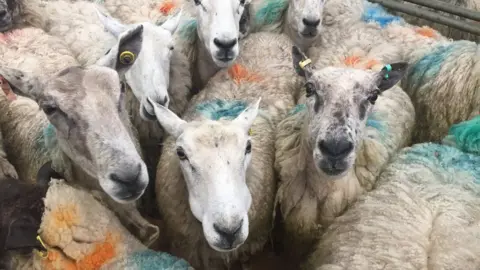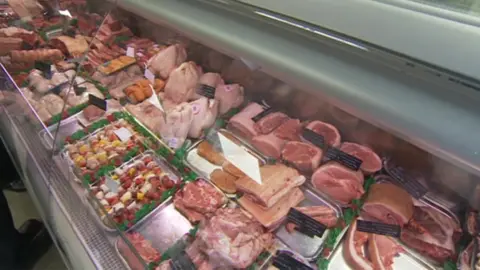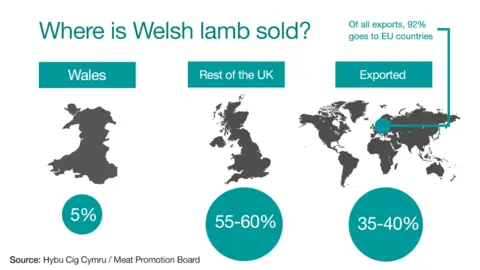Rees-Mogg says farmers will be 'looked after' in a no-deal Brexit
 BBC
BBCWelsh farmers will be "looked after" in the event of a no-deal Brexit, Jacob Rees-Mogg has said.
The new leader of the House of Commons made the pledge to address farmers' fears they will suffer from the European Union imposing tariffs on EU countries importing meat from Wales.
Currently, as members of the EU's single market and customs union, Welsh lamb exports do not face import taxes.
But without a deal, lamb products could face tariffs of more than 40%.
"The prime minister has already said if that happens, then any farmers who are affected by tariffs from the EU will be looked after," Mr Rees-Mogg said on a visit to Crickhowell, Powys.
"It's worth remembering that if the EU were to put tariffs on to sheep meat imports into the EU that would put up their cost of lamb by 20%, so they'd be cutting off their nose to spite their face."

How do tariffs work?

If countries do not have free-trade agreements, they trade with each other under rules set by the World Trade Organization (WTO).
Each country sets tariffs on goods crossing its borders. All EU countries share common tariffs because they are all signed up to the customs union.
EU tariffs on most agricultural products can be very high - dairy averages more than 35% and for some meat products, such as lamb, it is more than 40%.
As the UK is still a member of the EU, it applies EU tariffs to goods coming in from the rest of the world, but has no tariffs with the EU itself.
But Brexit will change that.
The UK could choose to reduce the tariffs for goods coming from the EU - in order to keep trade flowing through ports like Dover. But it would have to offer the same reductions to all other countries as well.

New Prime Minister Boris Johnson said this week the UK would leave the EU on 31 October with or without a deal, but believed a deal was possible.
But farming unions in Wales predicted protests would take place if the country left without a deal.
As well as tariffs, they also fear the impact of losing subsidies worth about £300m a year from the EU - known as the Common Agricultural Policy - which makes up 80% of their income on average.
Ministers in Westminster have promised to maintain current funding levels until 2022, while the Welsh Government will continue with the EU's Basic Payment Scheme until 2020 before introducing a five-year "transition" towards a new system.

Mr Rees-Mogg was also asked about the replacement for the EU Structural Fund, which is used to help the most deprived communities post-Brexit.
Since 2000, more than £5bn has flowed into Wales aimed at reducing inequalities and increasing opportunities.
The UK government has promised a Shared Prosperity Fund as a replacement, but has been criticised for delays in revealing how the scheme would work.
"Detail is already there for the interim period but there is no detail in what will happen in the next financial framework under the EU anyway, so there is as much details as there is until the end of 2020 and after 2020 the EU hasn't made any declaration about structural funds," said Mr Rees-Mogg.
His visit to Wales came ahead of Thursday's Brecon and Radnorshire by-election, which was triggered after a successful recall petition in the constituency following the conviction of Tory incumbent Chris Davies for a false expenses claim.
He has been reselected for the Conservatives. Tom Davies for Labour, Jane Dodds for Liberal Democrats, Des Parkinson for the Brexit Party, Liz Phillips for UKIP and Lady Lily the Pink for the Monster Raving Loony Party are also taking part.
Plaid Cymru and the Greens chose to back the Lib Dems for the poll in a pro-EU pact.
